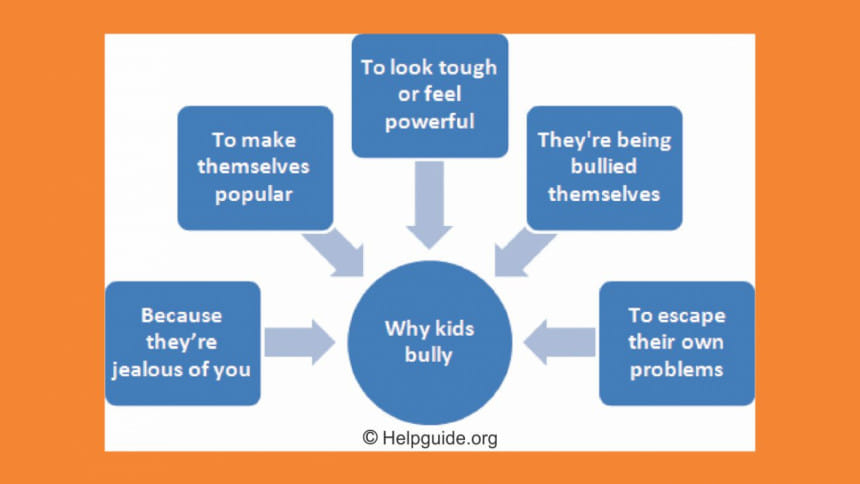Bullying: Break the Cycle

If some of us were permanently judged by the mistakes that we had made as children, we would be considered abominable human beings. Discovering someone close to you was a bully as a child can be unsettling.
Maybe it was the new kid who joined your class from a different school and couldn't cope with your curriculum. Maybe it was that girl who was slightly overweight, or the boy who didn't have his uniform ironed every day. It could, as well, have been the toddler who could never gather the courage to ride the slide in the playground, or because he looked 'funny', you wouldn't let him play with you. If only you had known that calling someone fat could lead to that person developing eating disorders and feeling insecure about himself/herself for the rest of their life; or that calling someone a coward at such a young age could break his/her confidence once and for all and lead them to do something that could prove fatal.
Narsis Rahman, senior child psychologist, Institute of Child and Mother Health (ICMH) and internationally registered autism trainer, said, “I've had patients who were first or second graders and had been victims of bullying. The incidents had been so traumatic for some of them that they developed a negative attitude towards life. They refrained from going to school and started having frequent panic attacks. Being bullied could change their personalities completely, and without proper counselling, it would be very difficult for them to recover from the trauma.”

It is a vicious cycle. You could have been bullied yourself. It could have been a case of peer pressure and you might have ended up with the wrong group and could have acted accordingly. There could be a number of reasons for the way you acted. Narsis Rahman added, “Children who are exposed to a lot of negativity at home tend to become bullies.” But in saying that, there really isn't an excuse you could make for bullying someone, which is what aggravates the guilt of realising these mistakes even more.
Media, education and most importantly, age bring about certain changes in our thoughts on this matter, those that you might have lacked when you were in school. And this guilt acts like a parasite, feeding on you as you grow; a feeling that pulls you back down even if you're trying to be a better person. “Realising their mistakes could have a dramatic impact on them. They might go on to having adjustment problems in their personal lives later into their adulthood,” said Rahman.
While you could always apologise for your past actions, it does take a lot of courage to stand up to the person whom you might've caused almost irreparable mental or even physical damage and there is no way you could wipe out those days from your past, mainly because “sorry” might seem too little. But every action counts. With time, they would've matured as well and might actually listen to your side of the story, if there was ever one. Befriending them, helping them out if they ever need it, or even just being acquaintances and engaging in small talk once in a while if they are comfortable with it might make things look up a bit between you two.
What's important is that you don't let similar things happen to somebody else. If you have siblings or cousins in school who you think might be following your footsteps, talk to them about it; let them know of the consequences of their actions. If they are being bullied, talk to the people who are bullying them, or even their teachers, and most importantly, their parents. Rahman explained further, “I think parents play the most important roles in these situations. Children and adolescents demand the most attention and parents should be especially aware of their children's actions during these stages. Strengthening their bonds with their children and even an hour of quality time a day is mandatory.”

 For all latest news, follow The Daily Star's Google News channel.
For all latest news, follow The Daily Star's Google News channel. 



Comments